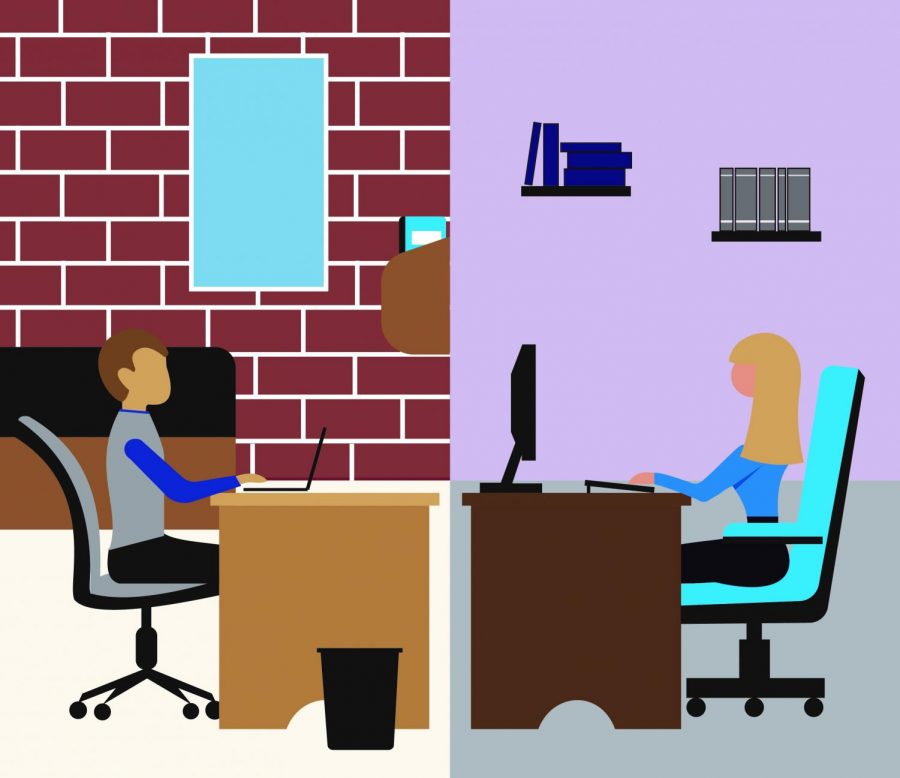Virtual health services offered during COVID-19
April 15, 2020
Many of the health services provided to students during the usual school year will still be provided virtually. These services include Student Counseling Services, Student Health Services, Wellness Center services and Disability Services. These services aim to provide resources to students for their health and overall success.
Student Counseling Services
Amidst the COVID-19 changes, the services offered by Student Counseling Services (SCS) will still be available to students.
Director of Counseling for Student Counseling Services Cindy Bruns described the changes being implemented into the clinic during the COVID-19 restrictions.
Bruns said a majority of counseling is now done over the phone and secure chat messaging. She also said SCS is trying to avoid walk-in crisis services like they provided before COVID-19 restrictions. Instead, students are encouraged to call in to schedule time to talk to a counselor.
If the student needs to talk to a counselor immediately, the front desk can try to get them in touch with a counselor. If it is determined the student needs in-person help, counseling will respond to the student in person.
“It’s sort of business as usual for us, except that we’ll be using both phone and secure chat methods to deliver those services unless there’s a particular need to see a student face to face,” Bruns said.
Bruns also said SCS is working on developing how to better reach students who now reside outside of Washington, but with different licensing laws state-by-state it can get tricky.
SCS is also encouraging students to reach out if they are not in a space secure enough for virtual counseling so they can collaborate to find a time that works best for the student.
“We’re hoping that it’ll be very similar to what we’ve been able to offer, just with it being virtual as long as we need to be maintaining physical distancing,” Bruns said.
Student Health Services
Health Center Director Carylin Holsey said Student Health Services (SHS) is looking into telehealth services and virtual options. SHS is also looking into how to best reach students residing outside of Washington.
SHS has practitioners and health providers working to provide medical services to students who need immediate medical attention.
According to Holsey, SHS is not providing testing for COVID-19 per request of Kittitas County. Instead, SHS can determine if a student needs testing and direct the student where to get it.
Wellness Center
The Wellness Center provides information about topics such as nutrition, body image, drugs and alcohol, mental health, sexual health, relationships and more. Marissa Howat, the director of the Wellness Center, said all the Wellness Center’s services will continue to be provided virtually.
Howat said direct service options will be moving to virtual services using confidential video conferencing to meet with survivors of violence, including sexual assault. The Wellness Center can also provide confidential meetings for students who want to discuss drug/alcohol abuse recovery and fill university sanction for drug/alcohol policy violations.
Howat said the Wellness Center is working with Aspen, Ellensburg’s center for providing resources to survivors of abuse and assault, to provide a 24/7 phone line for students in need of support.
Howat said to increase their student reach, the Wellness Center is increasing activity and sharing information on social media platforms and YouTube. The YouTube videos made by the Wellness Center will be covering topics such as making healthy meals and dealing with relationships during COVID-19 restrictions.
“We think this will challenge us to better meet the needs of students who have been at centers or students who are primarily online anyway,” Howat said. “This is a challenge we are excited to try and meet.”
Disability Services
Director of Disability Services Wendy Holden said Disability Services already served online students, so going entirely online has been a fairly smooth transition.
Disability Services will have meetings with students over the phone or video conference to identify barriers and put accommodations in place for them. Holden said Disability Services will continue to do regular check-ins with students and troubleshoot for accommodation issues. Disability Services will also provide online resources through Canvas, such as strategies for success in online classes and more.
Holden said Disability Services is working with faculty and staff to determine if they’re taking consideration into accessibility for courses and activities.
“We’ve been asked to be a part of the larger university conversation around diversity and equity, so that we’re making sure that diverse populations are being considered when the university is making decisions,” Holden said.

